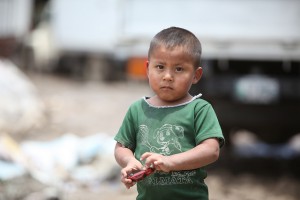Proof of Child Sponsorship’s Value
By Ken Walker-
First of two parts

However, the cover story of the June issue of Christianity Today verifies that such stories are more than “anecdotal” evidence, the kind often scorned and discounted by critics.
Academics in particular have been known to sniff that journalists fail to do the kind of peer-reviewed research that will stand up to scrutiny. To which I say: try being a journalist on deadline who: 1) doesn’t have months to research a topic, 2) doesn’t have a staff doing field work, and 3) doesn’t have time to get work reviewed by numerous sources prior to publication.
Study of Sponsorship
That is why economic professor Bruce Wydick’s story tickled me. And, made me quite pleased to write a companion feature.
As Wydick details in his story, research that looked at more than 10,000 individuals sponsored through Compassion International verified that:
- In all six countries Wydick and his team examined, sponsorship resulted in better educational outcomes for children.
- Overall, sponsorship made children 27 to 40 percent more likely to complete secondary school, and 50 to 80 percent more likely to complete a university education.
- There is also evidence that sponsorship had spillover effects on unsponsored, younger siblings of non-sponsored children.
“To put it simply, the educational impacts of sponsorship are large—roughly equal to the substantial effects of the Rosenwald Schools program that from 1913-31 educated blacks in the Jim Crow South,” Wydick writes.
“They are roughly double those of Oportunidades, the celebrated conditional-cash-transfer program that gives cash to mothers in Mexico for keeping their children in school. It’s so successful it has been replicated in dozens of developing countries around the world with financial incentives from the World Bank.”
Effects Beyond Education
The results go beyond education. Wydick’s team found that because of sponsorship, when a child grows up he is 14 to 18 percent more likely to obtain a salaried job. And, 35 percent more likely to secure a white-collar occupation.
Many Compassion-sponsored children eventually become teachers instead of working in menial labor or not finding a job. There is also evidence that they are more likely to become community and church leaders.
What’s more, these feel-good results aren’t restricted to a Christian publication. Wydick’s academic paper with the methodology and results of this study appears in the current issue of the Journal of Political Economy.
Yet, one of the most fascinating comments appears during Wydick’s interview with Wess Stafford, who has since retired as Compassion’s president. When he asked for a deeper reason sponsorship works, Stafford replied, “Try hope.”
Stafford went to explain, “The big difference that sponsorship makes is that it expands children’s views about their own possibilities.
“Many of these children don’t think they are capable of much. We help them realize that they are each given special gifts from God to benefit their communities, and we try to help them develop aspirations for their futures.”
Beneficial Impact

Like any human institution, sponsorship has its flaws and shortcomings. Most notably, in 1998 the Chicago Tribune published the results of a two-year-long investigation of child sponsorship. The paper reported that two dozen deceased children were on the rolls at Save the Children.
Still, as Wheaton College professor Susan Greener told me, well-run programs educate supporters about global poverty and promote resilience.
“Children are growing, and their developmental needs are immediate,” she says. “It is better to act imperfectly than to wait for the perfect model.”
Next time: More about the sponsored child who went home to Africa


